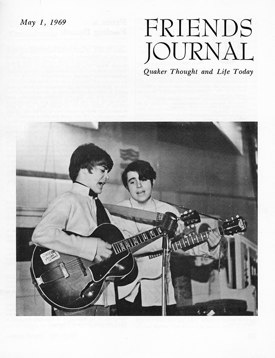By the time you receive this issue, I will have retired as senior editor. It was 12 years ago that I answered a want ad in the Philadelphia Inquirer for an editorial position here. Now I am ready and happy to pass editorial responsibilities on to others.
One of my unspoken goals has been to push the envelope of readers’ expectations. What good does it do to be too predictable?
Another goal has been to let Friends Journal show the full spectrum of Friends thoughts and activities, to be a forum where we can share what is really on our hearts and where we can practice the discipline of listening attentively to each other. Sometimes we are inspired; sometimes we face up to the fearsome challenges we encounter on this planet.
This August issue is a good case in point. It begins with three inspiring articles that we have carried over from the rich body of submissions that came in for the June/July special issue on Pendle Hill. Keith Helmuth, in "Nurturing the Seeds of Human Betterment" (p. 6), recounts the origins of the Quaker Institute for the Future. Ron Pudlo, in "Writing Midrashim at Pendle Hill" (p. 9), gives unexpected interpretations of familiar biblical stories. And Meg Hodgkin Lippert, in "Who Was Joy Hodgkin?" (p. 13), presents a touching view of the wife of Pendle Hill’s first director of studies.
Then comes a challenge. Karen Street’s "Earthquake, Tsunami, and Nuclear Power in Japan: The Ocean of Light above the Ocean of Darkness" (p. 17) states a case for continuing to utilize nuclear power despite the many problems that have emerged. A sharply contrasting view appears in the Viewpoint "Quaker Earthcare Witness: Minute on Nuclear Fission in Light of the Disaster in Japan" (p. 5). I encourage all readers, including those with a fixed view on nuclear power, to look at these two pieces side by side.
A historical piece follows: "The Story of Japanese Quaker Inazo Nitobe, 1862- 1933," by Samuel M. Snipes (p. 21). Several decades ago, when I was on another career path and deep into research on the international history of the 1920s, I encountered Nitobe’s name frequently in his role as under-secretary general of the League of Nations in Geneva. This different perspective on him has come to me as a complete surprise; it could be inspirational to a young Friend who aspires to a career in politics or diplomacy.
The last article, by Allan Kohrman, "Toward a More Balanced Analysis of Zionism" (p. 25), is a response to two pieces published recently in FJ.
I commend all of these articles to you for your August reading, whether you find yourself at home, commuting to work, or perhaps at a campsite or on a beach.
Thanks to those who have shared your writings and illustrations so generously in Friends Journal. Your willingness to do so is what really makes this ministry happen. As I leave the staff, I know I will miss the nurturing of my colleagues and of all the volunteers who support this work, including the steady stream of lively interns who choose to spend time with us.
In retirement, as Friends Journal evolves and changes, I plan to remain a part of the community—as a reader, and perhaps occasionally as a writer. I offer my best wishes and warm appreciation to those who are taking on the work of this vital channel for community.


